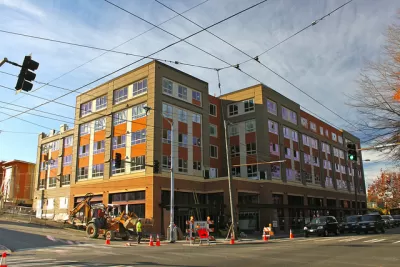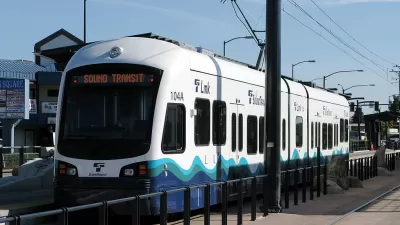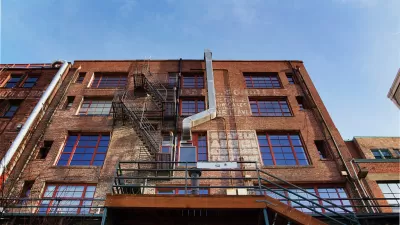As excitement builds around Seattle's voter-approved transit expansion plan, the REDI Fund will preserve space for low and middle-income residents in new transit-oriented developments.

Following the passage of Seattle's Proposition 1 in November, opportunities for transit-oriented development abound. So does private money and the potential for a glut of luxury housing. Far in advance of the transit, Oscar Perry Abello writes, "luxury developers — who typically have easier access to cash — buy up lots and buildings, which can lead to rising rents and displacement of longtime residents."
To help nonprofit and affordable housing developers compete, "Seattle joined with public and private partners from the region and beyond [...] to launch the Regional Equitable Development Initiative (REDI) Fund, a $21 million revolving loan fund to provide early low-cost financing for acquisition of transit-accessible property to build housing for low-income, working families."
Housing advocacy nonprofit Enterprise Community Partners designed the fund, providing $6.5 million toward its initial capital. The REDI Fund mandates that properties acquired with its financing will at minimum "build or preserve a share of homes affordable to households under 80 percent area median income (AMI), and 25 percent of the homes built or preserved using the fund will be affordable to households under 50 percent AMI. (In 2015, Seattle's AMI was $89,600.)"
FULL STORY: Seattle Starts $21M Loan Fund to Promote Affordable Housing Near Transit

Trump Administration Could Effectively End Housing Voucher Program
Federal officials are eyeing major cuts to the Section 8 program that helps millions of low-income households pay rent.

Planetizen Federal Action Tracker
A weekly monitor of how Trump’s orders and actions are impacting planners and planning in America.

Ken Jennings Launches Transit Web Series
The Jeopardy champ wants you to ride public transit.

Driving Equity and Clean Air: California Invests in Greener School Transportation
California has awarded $500 million to fund 1,000 zero-emission school buses and chargers for educational agencies as part of its effort to reduce pollution, improve student health, and accelerate the transition to clean transportation.

Congress Moves to End Reconnecting Communities and Related Grants
The House Transportation and Infrastructure Committee moved to rescind funding for the Neighborhood Equity and Access program, which funds highway removals, freeway caps, transit projects, pedestrian infrastructure, and more.

From Throughway to Public Space: Taking Back the American Street
How the Covid-19 pandemic taught us new ways to reclaim city streets from cars.
Urban Design for Planners 1: Software Tools
This six-course series explores essential urban design concepts using open source software and equips planners with the tools they need to participate fully in the urban design process.
Planning for Universal Design
Learn the tools for implementing Universal Design in planning regulations.
Heyer Gruel & Associates PA
Ada County Highway District
Institute for Housing and Urban Development Studies (IHS)
City of Grandview
Harvard GSD Executive Education
Toledo-Lucas County Plan Commissions
Salt Lake City
NYU Wagner Graduate School of Public Service





























